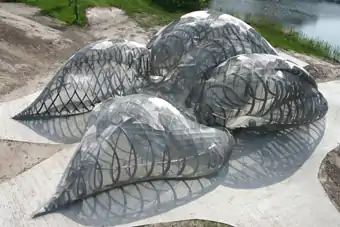Edwin van der Heide | |
|---|---|
| Born | 1970 Hilversum, Netherlands |
| Nationality | Dutch |
| Occupation(s) | Sound artist, composer |
| Awards | |
Edwin van der Heide (born 1970) is a Dutch sound artist and composer known for his immersive installations and performances, currently living in Rotterdam.
Biography

Van der Heide was born in Hilversum, Netherlands, and studied Music Technology in Utrecht and Sonology at the Royal Conservatory of The Hague.
He has developed his academic activity in The Hague, where he was lecturer and later also co-director of the ArtScience Interfaculty[4] of the Royal Conservatory and the Royal Academy of Arts. Currently, in addition to pursuing his artistic career, he is a lecturer and researcher at the Faculty of Science of Leiden University.[5]

Van der Heide began his artistic career as a composer and performer in the field of electronic music. Along with Zbigniew Karkowski and Atau Tanaka, he was a founding member of Sensorband.[6] From giving stage based performances, he has developed his work in the fields of sound, interactive, and audiovisual installations.[7][8]
Van der Heide's installations are characterized by the importance of sound, and by the use of other spatial media, such as light (including lasers), real fog or smoke, creating immersive and sensory experiences for the audience.[9]
His work has been presented at the Reina Sofía Museum in Madrid,[10] the MAXXI in Rome,[11] the Stedelijk Museum in Amsterdam,[12] Art Basel in Basel,[13] and the Locarno International Film Festival.[14]
Van der Heide was awarded the Composition Prize of the Beethoven Foundation in Bonn, in 2015.[15] In 2018, he was commissioned to develop the installation CHIASM for the city hall of Barcelona to open and celebrate the 25th edition of Sónar 2018.[16][17]
Collaboration with architects

Edwin van der Heide collaborated extensively with architects.[18] Together with Victor Wentink, he conceived a generative and interactive sound environment for both the freshwater part by NOX (Lars Spuybroek) and the saltwater part by ONL (Kas Oosterhuis) of the Water Pavilion (1997), part of the Deltapark at the artificial island Neeltje_Jans. The approach was not to have a building with separate content inside but to create a true integration of architecture, sound and light.
In 2004, Lars Spuybroek and Edwin van der Heide realized the interactive architectural sound sculpture Son-O-House. For the exhibition of his installation Pneumatic Sound Field, part of the Synthetic Times[19] exhibition at the National Art Museum of China (NAMOC) in 2008, Lars Spuybroek designed a dedicated pavilion. As part of Sónar 2014, van der Heide realized his composition Spectral Diffractions for the Barcelona Pavilion by Mies van der Rohe.[20][21]
Discography
- Voltage, Edwin van der Heide & Zbigniew Karkowski, Bake Records 020, Staalplaat, 1999
- Datastream, Edwin van der Heide & Zbigniew Karkowski, ORCDR01, Or Records, 1999
- AREA/PULS, Sensorband (Edwin van der Heide, Zbigniew Karkowski & Atau Tanaka), SONORIS, 2000
- Traceroute, UBSB (Ulf Bilting, Edwin van der Heide, Zbigniew Karkowski & Atau Tanaka), Touch - Ash International, 2000
- Just about Now, V2 label, 2000
- Meltdown of Control, Staalplaat MAV, 2000
- Wavescape, Staalplaat stmcd 025, 2003
- Anthology of Dutch Electronic Music 1999–2010, BASTA, 2011
- Aoyama Noise – Live at Cay, Airplane Label, 2011
- Spectral Diffractions, Fundacio EINA, 2014, ISBN 978-84-617-0298-5
- Pneumatic Sound Field, ALKU, 2014
References
- ↑ "Ars Electronica Archive - Prix". Retrieved 4 May 2020.
- ↑ "Split Film Festival". Retrieved 4 May 2020.
- ↑ "2009: Edwin van der Heide - Witteveen+Bos-Prijs voor Kunst+Techniek". www.kunsttechniekprijs.nl. Retrieved 14 December 2018.
- ↑ "spatial interaction lab | ArtScience Interfaculty". Retrieved 2018-12-10.
- ↑ "Edwin van der Heide's page at Leiden University". Retrieved 26 November 2018.
- ↑ Bongers, Bert (Spring 1998). "An Interview with Sensorband". Computer Music Journal. 22 (1): 13–24. doi:10.2307/3681041. JSTOR 3681041.
- ↑ "Edwin van der Heide - Monoskop". monoskop.org. Retrieved 2018-12-10.
- ↑ Wilson, Stephen (2010). Art + science now. Thames & Hudson. pp. 108, 115. ISBN 978-0-500-23868-4.
- ↑ Altena, Arie. "A Spatial Language of Light and Sound - Interview with Edwin van der Heide by Arie Altena". The poetics of space. Sonic Acts Press. pp. 137–148. ISBN 9789081047036.
- ↑ "Actividad - HyperSounds -". www.museoreinasofia.es (in Spanish). Retrieved 2018-12-10.
- ↑ Trincardi, Giulia (2015-05-15). "Roma fiorisce con Spring Attitude, tra performance audiovisive e musica elettronica". Creators (in Italian). Retrieved 2018-12-10.
- ↑ Broeckmann, Andreas. Deep screen : art in digital culture : Voorstel tot Gemeentelijke Kunstaankopen 2008 = proposal for municipal art acquisitions 2008. Stedelijk Museum. ISBN 9789050061759.
- ↑ "Art Basel Parcours Preview". artnet News. 2015-05-27. Retrieved 2018-12-10.
- ↑ "Let's Get Digital (Arts)". www.locarnofestival.ch. Retrieved 2018-12-10.
- ↑ "Beethoven Stiftung Bonn". www.beethovenstiftung-bonn.de. Retrieved 8 August 2018.
- ↑ Bosco, Roberta (13 June 2018). "El Sónar hackea al Ayuntamiento". El País (in Spanish). ISSN 1134-6582. Retrieved 8 August 2018.
- ↑ "Sónar presents the audiovisual installation". Sónar Barcelona. Retrieved 10 December 2018.
- ↑ Weibel, Peter (2019). Sound art : sound as a medium of art. MIT Press. p. 538. ISBN 9780262029667.
- ↑ Synthetic times : media art China 2008. MIT Press. 2008. ISBN 9780262512268.
- ↑ "Edwin van der Heide. Spectral Diffractions". Fundació Mies van der Rohe.
- ↑ Spectral Diffractions. Barcelona: Fundacio EINA. 2014. ISBN 9788461702985.
External links
- Edwin van der Heide discography at Discogs
- Edwin van der Heide on V2 Institute for the Unstable Media's website
- Official website